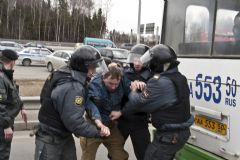Human Rights Voices
While the UN devotes its human rights operations to the demonization of the democratic state of Israel above all others and condemns the United States more often than the vast majority of non-democracies around the world, the voices of real victims around the world must be heard.
Russian Federation, July 28, 2020
Jehovah’s Witness in Russia Convicted of Extremism, Concern Over Crackdown
Original source
A court in Russia has convicted and fined a Jehovah's Witnesses follower amid growing global concern over a campaign of persecution in the country against adherents of the religion.
Russia's Supreme Court ruled the religion as an extremist organization in April 2017 and since then, the group has complained that authorities have raided more than 1,000 properties of its followers. There are 372 believers under criminal investigation and 43 people are in prison-including 10 who have been convicted of extremism.
Yevgeniy Spirin, 34, had spent 160 days in pretrial detention and had been under house arrest from July 5, 2019, before his sentence was handed down on Tuesday on charges of organizing the activities of an extremist organization.
The Furmanovsky City Court in the Ivanovo Region convicted Spirin and fined him 500,000 Russian rubles ($6,920). Spokesman for the Jehovah's Witnesses, Jarrod Lopes, said the conviction was "in complete disregard for the religious freedom enshrined in Russia's Constitution."
He said that raids had continued despite government assurances that followers were able to practice their religion at home. "The current state of religious freedom in Russia is reminiscent of Soviet times. It is well documented that Jehovah's Witnesses did not renounce their faith during Soviet oppression," Lopes said in a statement to Newsweek.
"Likewise, the persistent threat of arrest and imprisonment since the 2017 ban has not deterred our fellow believers in Russia today."
Authorities in Russia have long been suspicious of the proselytizing nature of the religion.
Executive director of Human Rights Without Frontiers International (HRWF), Willie Fautré says it poses a challenge to the dominance of the Russian Orthodox Church.
"They are perceived as competitors by the extremist groups in the Russian Orthodox Church and also because they have their historical roots outside the country and culture and civilization," he told Newsweek.
"That's what those groups want to protect; the Slavic identity and Orthodox culture against the perceived invasion of Western values and religions coming from outside which are perceived as a threat to their Russian identity."
A report earlier this month by the United States Commission on International Religious Freedom (USCIRF)-a bipartisan U.S. federal government commission-said that the campaign against the religion had been spearheaded by the Russian activist Alexander Dvorkin, who has fought against movements he deemed as "cults."
In an interview with Russian state media after the religion's ban, Dvorkin said he wanted to protect the rights of followers because the faith "maintains strict control over every aspect of its members' lives," which the religion rejects.
He also denies that they are Christians because he says they don't believe in the divinity of Jesus Christ, according to NPR. While they do not believe in the Christian tenet of the Trinity, the Jehovah's Witnesses say they follow the teachings of Christ and consider him the leader of their church.
Fautré said: "The Russian Orthodox Church, or part of it, is backing the crusade of Alexander Dvorkin against any group identifying itself as Christian and that is perceived as a competitor in the market of religion.
"Dvorkin represents a radical nationalist right wing part of the Russian Orthodox Church and he is supported by such groups, but not all. Intellectuals in the Orthodox Church disagree and say it is counterproductive to do what he was doing.
"Some branches of the church would be more open to dialog to that sort of competition of religious movements with historical roots outside the country," Fautré told Newsweek.
More than 100 raids took place on July 13 in the Voronezh Region in a crackdown that got international attention. The OSCE said that the "repression against members of a peaceful religious minority group is truly shocking." The raids were also criticized by the European Union and the British government.
One of those raided that day was Aleksandr Bokov, who told Newsweek about the fear he and his wife felt when Special Rapid Response Unit (SOBR) officers banged on his door at 6 a.m.
"They ordered my wife and me to lie down on the floor. At the same time, they hit me hard on the ribs and pushed me to the floor. The investigator began to read the search warrant to me. I had to listen to her lying on the floor," he said in a message sent via the encrypted social media messaging app Telegram.
Bokov said that two officers took him to the kitchen, leaving his wife in another room and he was again ordered to lie on the floor. Officers demanded that he reveal the passwords for his electronic devices.
"They began to squeeze my ears and nose, they hit me hard on the ribs, head, legs. I was hurt and scared for both me and my wife."
After the seven-hour search, he said that the incident had left both him and his wife traumatized. He has not been formally charged but said he was told to expect a criminal prosecution.
"I felt terrible. I felt humiliated in my own home. I cannot understand how such treatment of an innocent person is possible in modern society.
"My wife and I experienced a lot of stress. We are emotionally and physically exhausted," he told Newsweek. "We are also afraid that that raid will happen again and we will face abuse again."

